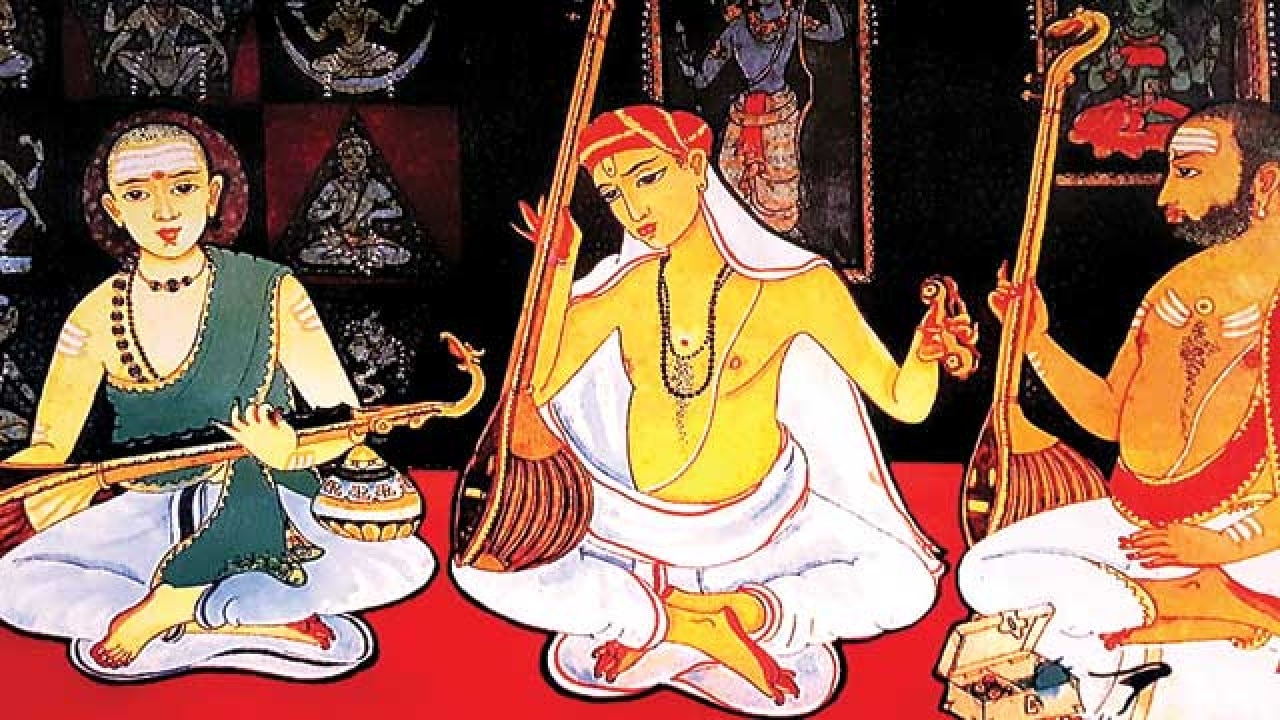
We Indians love to boast about our great country. However, can a Malayali name the language of Meghalaya? Does a Bihari know Basavanna? And how many born north of the Vindhyas — even musicians — know that this is the 250 birth anniversary of Tyagaraja (1767-1847), one of the world’s greatest music composers?
Once, sarod maestro Amjad Ali Khan attended Tyagaraja’s anniversary celebrations in Tiruvaiyaru village. Seeing Carnatic musicians young and old, coming at their own expense, finding their own accommodation, just for the privilege of singing Tyagaraja’s songs at the poet’s samadhi, he exclaimed, “I wonder how many Hindustani musicians will come to a Tansen festival on their own!” The mystique of Tyagaraja was felt by Pandit Jasraj, who once took a game shot at singing the south Indian’s song.
In today’s era of linguistic lobbies, it may be surprising to see a man, who composed in his mother tongue Telugu, venerated by Tamils. Nor did Serfoji II, the Maratha ruler of the region back then, take offence at Tyagaraja’s refusal to come to his court, nor even when the man composed a song asking, “Is it better to worship Lord Rama — or sing in praise of men?”
Closer to our times, a protest movement demanding Tamil songs in Carnatic concerts simply could not dislodge Tyagaraja’s primacy. So influential is Tyagaraja’s contribution that Telugu continues to dominate Carnatic music, a classical genre nurtured in Tamil Nadu, where most listeners remain ignorant of the meaning of what they hear. In fact, their adoration of Tyagaraja made several Tamil composers learn and compose in Telugu.
Listen to Tyagaraja and you wonder — can any other composer rival his adventurous spirit? He turns so many rare scales — strange, eerie, outré — into ragas. He is user-friendly — with songs a child can breeze through, songs challenging veterans. He has compositions suitable for every part of the concert — lively or solemn, easy or sophisticated. Nor does a concert of only Tyagaraja songs bore listeners.
Ironically, Tyagaraja is deified by followers who ascribe his music to some divine source pouring out through a human vehicle, thus minimising his artistic achievements. However, his own inclusive vision sees a god who also lived on earth as a man — Rama is a child, husband, brother, friend, wanderer, warrior and saviour. Tyagaraja’s devotion does not prevent him from painting in his lyrics multiple “realistic” scenarios, and an intriguing range of human emotions.
He takes us through the human odyssey of passion, fear, doubt, desperation, bitterness, regret, ecstasy and peace — personal and universal. He also tells you about the ways of the world and the wiles of men, pitfalls and temptations, not from a pedestal, but as a sympathetic fellow traveller. Sure, there are deep philosophical soliloquies, and intimate whisperings to his chosen deity. But Tyagaraja can also playfully tease his Rama, “Don’t forget you became great only because you married our Janaki!” Or admonish him, “Didn’t you vow to save everyone who surrendered to you? Don’t you have self- respect? How can you forget me?”
Rama means many things to many people. What did he mean to Tyagaraja? Tyagaraja’s dreams of Rama and Ayodhya imagine an ideal where truth force (satyagraha), non-violence (ahimsa) and compassion (karuna) are one. Rama is the sum of these eternal values lighting up our human soul. And this Rama is nothing but music, enchanting everyone on earth, leading us to that primal sound the poet called Nadabrahman. Is this how he saw his Rama saving humanity?